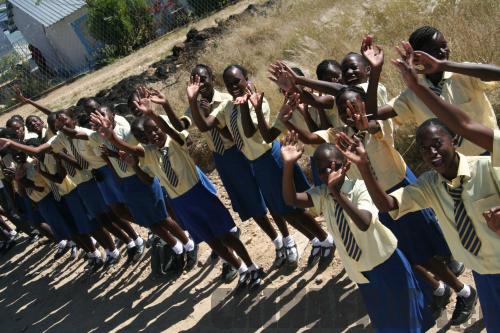|
 |
|
NAMIBIA: Welcome to Windhoek (YU NAN) |
Inter-party exchanges
The Young Leaders Forum not only acts as "a new yet important platform for China and Africa to increase exchanges among our young people," said Wu Bangguo, Standing Committee Chairman of the National People's Congress, China's top legislature, at the forum's opening ceremony, but is an epitome of closer party-to-party exchanges.
The inter-party exchange between the CPC and African political parties is an important part of Sino-African relations. On the basis of the principles of independence, equality, mutual respect and non-interference in each other's internal affairs, the CPC has established relations with 71 parties from 42 Sub-Saharan countries, maintaining frequent exchange visits with 56 of them, according to the International Department of the CPC Central Committee (IDCPC).
African political parties also attach great importance to inter-party communication. South African Deputy President Kgalema Motlanthe said that inter-party communication serves as the basis for inter-governmental cooperation. "Sometimes problems that cannot be solved by governmental consultation could be easily settled through inter-party exchanges," he said.
Using inter-party exchanges as a bridge to promote economic and trade cooperation is a new highlight of the CPC's work in recent years, as it extended the area of exchange and expanded contacts.
Activities organized by the IDCPC include the first China-Africa Forum on Cooperation of Small and Medium-Sized Enterprises and the China-Arab/Africa Medium and Small Businesses Cooperation Forum. They have proven fruitful in helping domestic enterprises conquer the financial crisis, and promoting the cooperation in trade and investment with relevant countries and regions.
The increased exchanges from politics to business, trade and other areas have played a key role in promoting the strategic partnership between China and Africa, said Ai Ping, Vice Minister with the IDCPC.
Veikko Nekundi, Secretary for Economic Affairs of SWAPO Party Youth League, said that it is good practice to enhance bilateral economic and trade cooperation through inter-party exchanges, adding that young leaders from China and Africa are in the position to influence and promote bilateral economic affairs.
A ready indicator of how important China and Africa are to each other is their booming economic and trade cooperation, which serves as a major driving force for the overall bilateral relations.
China-Africa cooperation is a win-win cooperation that brings tangible benefits to both sides. In the past decade, bilateral trade volume ballooned from $10 billion to $126.9 billion. More than 1,600 Chinese companies have established operations in Africa. China has become Africa's largest trading partner and contributed over 20 percent to Africa's economic growth in recent years.
In view of this, Nekundi suggested that China continue to expand imports from Namibia in order to further promote trade balance. "Namibia also needs more Chinese value-added investment [especially] in the manufacturing sector so as to assist in the country's development," he told ChinAfrica.
Namibia SWAPO Party Secretary General Pendukeni Iivula-Ithana said that the role China is playing in the world is magnificent. "China is not only influential in the United Nations and World Trade Organization, but increasingly continues to play a more important role in the process of global economic governance," said the secretary general.
As Namibians and as Africans, Ivula-Ithana said they have realized the global importance of China and the inherent development potential of Africa. Given this, she believes that Africa's current challenge is to harness its potential and the opportunities offered by China and translate these into real growth.
She commended the SWAPO Party and the CPC for initiating such a historical gathering, and believed the forum will strengthen the current China-Africa relationship.
Moonsamy echoed her idea. She stressed the expansion of the role of China-Africa Young Leaders Forum to serve the overall interests of Sino-Africa relations, while saying that how to strengthen the economic freedom of Africa is still a topic worth talking about for all young leaders across the continent.
Voices of the future
During the two-day forum, young delegates from China and Africa discussed a broad range of topics related to China-Africa relationship, such as its historical roots, its context, the trade and investment relations, and the role of media in shaping the relations. They not only met new friends but also got different views from their friends.
"We are friends. China and Africa will always be the friends," said Amos Robert Siyantemi, Foreign Service Officer with International Department of the Chama Cha Mapinduzi Party of Tanzania. "The forum is a very useful platform. It should be a mechanism for youth exchanges. I wish it can rotate between China and African countries regularly," he added.
At the end of the forum, the Windhoek Declaration was reached, calling on young leaders in Africa and China to take their responsibilities seriously in national development and China-Africa cooperation.
According to the Declaration, this youth platform will become a part of the Forum on China-Africa Cooperation (FOCAC). The forum will rotate between China and Africa, making up the currently missing youth component in FOCAC.
Siyantemi's wish to see a long-term mechanism for youth exchanges is likely to be soon realized. |